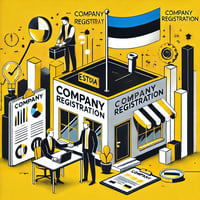
Steps to Set Up a Company:
Estonia
Choose a Business Structure
- Sole Proprietorship (FIE - Füüsilisest isikust ettevõtja): Single owner, full liability.
- General Partnership (TÜ - Täisühing): Two or more partners, shared liability.
- Limited Partnership (UÜ - Usaldusühing): General and limited partners.
- Private Limited Company (OÜ - Osaühing): Separate legal entity, limited liability.
- Public Limited Company (AS - Aktsiaselts): Separate legal entity, limited liability, suitable for larger businesses.
- Branch: A branch of a foreign company operating in Estonia.
- Representative Office: Limited to marketing and promotional activities, cannot conduct business transactions.
Register Your Company
- Choose a Company Name: Ensure it is unique and follows naming regulations.
- Prepare the Articles of Association (for OÜ and AS) or Partnership Agreement (for TÜ and UÜ): Outlining the company’s structure and rules.
- Register Online via the Company Registration Portal (e-Business Register): Submit the incorporation documents and pay the registration fee.
- Obtain a Registry Code and VAT Number: For tax purposes.
Open an Estonian Bank Account
- Set Up a Business Bank Account: Necessary for managing business finances.
Obtain Necessary Licenses and Permits
- Check Industry-Specific Requirements: Depending on the nature of your business, you may need specific licenses or permits.
Comply with Estonian Employment Laws
- Employment Contracts: Draft contracts that comply with Estonian labor laws.
- Register with the Estonian Tax and Customs Board: For tax withholding and social security purposes.
- Health and Safety Regulations: Follow guidelines from the Estonian Labour Inspectorate.
Accounting and Reporting
- Set Up an Accounting System: Maintain accurate financial records.
- Annual Financial Statements: Prepare and file annual financial statements.
- File Annual Tax Returns: Submit annual tax returns to the Estonian Tax and Customs Board.
Laws and Regulations to Consider
Corporate Law
- Commercial Code: Governs the formation and operation of companies.
- Partnerships Act: Governs partnerships.
Tax Law
- Income Tax Act: Governs income tax for individuals and companies.
- Value Added Tax (VAT) Act: Governs VAT regulations.
- Social Tax Act: Governs social tax contributions.
Employment Law
- Employment Contracts Act: Governs the terms and conditions of employment contracts.
- Occupational Health and Safety Act: Sets health and safety standards for workplaces.
- Social Insurance Act: Governs social security and health insurance contributions.
Data Protection Law
- General Data Protection Regulation (GDPR): EU-wide regulation governing data protection and privacy.
- Estonian Personal Data Protection Act: National implementation of GDPR.
Environmental Law
- Environmental Protection Act: Governs environmental protection and sustainability practices.
Intellectual Property Law
- Trade Marks Act: Governs the protection of trademarks.
- Patents Act: Governs the protection of patents.
By following these steps and adhering to the relevant laws and regulations, you can successfully establish and operate a company in Estonia. It’s advisable to consult with legal and financial experts to ensure full compliance and smooth setup.
When to Consider Setting Up a Company in Estonia:
- Strategic Geographic Location: Estonia’s location provides access to markets in the Baltic region, Scandinavia, and Eastern Europe.
- EU Membership: As an EU member state, Estonia offers access to the EU single market and its benefits.
- e-Residency Program: Estonia’s e-Residency program allows foreign entrepreneurs to establish and manage an EU-based company online.
- Favorable Tax Regime: Estonia offers a favourable corporate tax system with a flat 20% tax rate on distributed profits and 0% tax on reinvested profits.
- Highly Skilled Workforce: Access to a highly educated and skilled labour pool, particularly in technology and IT sectors.
- Innovative Digital Infrastructure: Estonia is known for its advanced digital infrastructure and strong emphasis on innovation and technology.
- Transparent Business Environment: Estonia offers a transparent and efficient regulatory environment with a focus on reducing bureaucracy.
- High Quality of Life: Estonia offers a high standard of living, excellent healthcare, and a favourable work-life balance, making it attractive for expatriates and international employees.
By considering these factors and aligning them with your business goals, you can determine if setting up a company in Estonia is the right move for your organization. Consulting with local experts and advisors can further help in making an informed decision.

Partnership
' We are thrilled to partner with Bizzvance to offer our clients a reliable and efficient way to establish and manage their businesses in Estonia,” said Andrew Collins, Business Owner at Grant and Graham Ltd. “Estonia’s business environment, combined with Bizzvance’s expertise, provides a fantastic opportunity for entrepreneurs looking to expand in Europe.'
🇪🇪 Estonian Company Registration Costs
For Estonian e-Residents:
From €600 (excluding VAT) + Consultancy fee 150 Euro per hour
Includes:
- Legal address (1 year)
- Contact person (1 year)
- State fees
- Beneficial owner registration
Via Power of Attorney:
From €850 (excluding VAT) + Consultancy fee 150 Euro per hour
Includes:
- Legal address (1 year)
- Contact person (1 year)
- State fees
- Notary fee
- Beneficial owner registration

Step-by-Step Guide: How to set up a Company
Setting up a company involves a series of crucial steps that require careful planning and execution. From choosing the right business structure to understanding legal and tax obligations, each stage is vital to the successful launch and operation of your business. This step-by-step guide provides a comprehensive overview of the key processes involved in establishing a company, ensuring you have the knowledge and tools needed to navigate the complexities of business formation.
